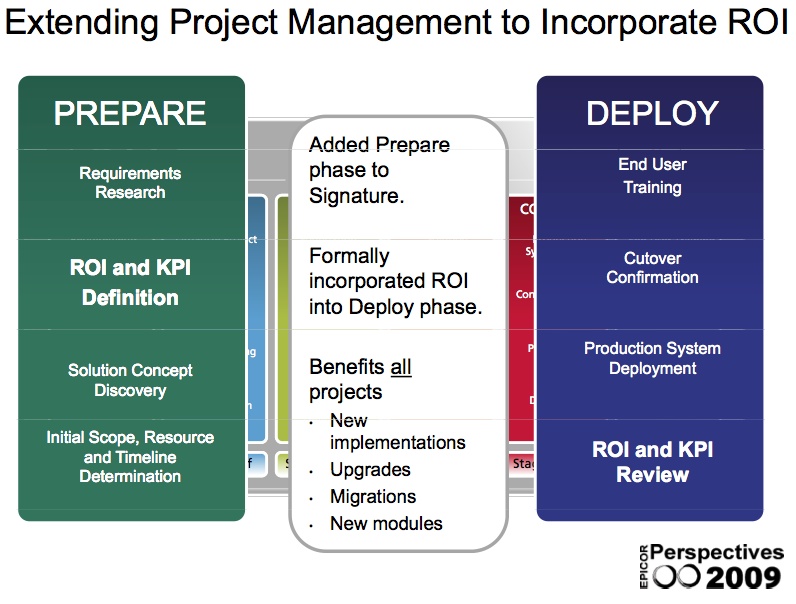Epicor's implementation cost drive: what does it really mean?

Epicor's announcement Monday that it has created a shared benefits program for implementations looks like a step in the right direction for those of us that want to see lowered implementation costs. On the face of it, the offer is compelling. According to the press release: "Upon project completion, if the project is under budget, the savings are shared 50/50. Conversely, if the project runs over budget, the customer is billed 50% of the contracted professional services hourly rates for all over-budget costs."
Fellow Enterprise Advocate Vinnie Mirchandani, was quoted in the New York Times as saying:
"[With] many large companies I help negotiate implement contracts for, we try and include a bonus/penalty piece based on budget, time, customer satisfaction and business results," Mirchandani said via e-mail. "So not unusual, but good to see a vendor proactively offer it."
Ray Wang - another EA - was quoted in the original press release making the more general comment: "Software vendors have this opportunity to take their position of strength and demonstrate how they can provide customers value during a down turn. In doing so, they will help their customers succeed and earn customer loyalty and good will when the economy picks up."
However, Frank Scavo yet another EA contacted me expressing concern that as it stands, the offer may lead to unintended consequences. He blogged that the announcement only addresses the cost side of the over all equation citing three potential problem areas:
- Project manager's lack of motivation to expend implementation dollars
- Choice of consultants where a project is stressed
- Focus on installation rather than benefits
Let's step back a moment. During his Monday keynote, George Klaus, Epicor's CEO was at pains to point out that customer service is a very big deal to the company: "We have to keep those upgrade customers because as you know it is far more expensive and difficult to acquire new." In her keynote, Lauri Klaus, EVP worldwide consulting continued the theme (see pic above.) However, the move to Epicor 9, the only product the company is selling these days, is often non-trivial.
I spoke with the customer services teams who, this week, have been putting out a strong upgrade message. I was impressed with the depth of tools, techniques and services that surround the Epicor 9 methodology. But let's be clear. It is a significant upgrade for those customers who or on anything other than Vantage 8. Dan Sirow, director at early adopter ICC told me: "It was easy for us as we were on Vantage 8. However, getting to Vantage 8 was a big challenge. We made the mistake - as many manufacturers do - of pretty much ignoring financials in earlier implementations. It was a major task to fix the problems. But once done, Epicor 9 was easy."
Given the complexity of Epicor 9 and the myriad customer variations of current implementation, it is easy to see how customers might significantly under scope their projects. Indeed at one level I can easily argue that for many Epicor customers, version 9 is a step too far. At least for now. That's not a criticism but a simple statement of fact about a product that is complex, demanding but could provide significant long term benefits. In order to better understand the situation, I spent time with Craig Stephens, VP Epicor consulting services. I asked him to walk me through the offering, addressing Frank's points.
"We want customers to understand they have a critical contribution to make in projects. It's a team effort where the customer's effectiveness impacts us. Shared benefit (aka risk/reward) allows us to draw attention to this," he said. Addressing Frank's specific remarks, Craig said: "I would have thought that a fixed price doubly incentivizes consultants to be in and out. That's why although the impact is broadly the same, we advise customers we'll agree a project budget." I then asked about change orders: "We can deal with those a number of ways - perhaps decide to park on the side or incorporate into the same shared benefit arrangement, depending on scale and likely impact."
On the matter of consulting quality, he had this to say: "We're at the early stages of rolling this out and there is still work to be done with consultants to get them fully on board. It doesn't make sense for us to put anything but the best consultants on a project that's becoming stressed, otherwise we lose out and the customer will be unsatisfied. During the preparatory stages, we are a lot more structured to take advantage of what we believe are best practices for industry verticals. They're not perfect but they're a formalized way for us to provide certainty. We also talk early on about ROI and KPI goals. We've been piloting a more proscriptive method in the UK. That's allowed us to shorten the amount of effort on the customer side though we still have about the same amount of effort on our side. We're certain we can bring projects in at reduced TCO and improved ROI, the latter because the overall investment is lower."
The devil as always is in the detail. On the basis of what I've seen in the standard implementation contract (but which I have agreed not to share publicly) I am satisfied Epicor's public statements about the scheme are fairly reflected in what customers are being asked to commit towards.
This will not be the end of the story. As the customer war stories emerge, we'll know whether Epicor's aims and intentions are met in the real world.
Disclosure: Epicor settled my travel and expenses to the conference.
